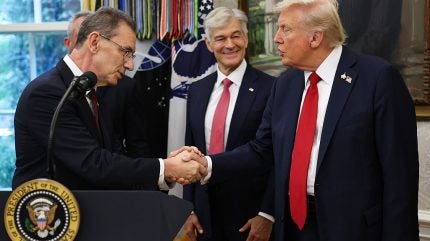
Pfizer is the first in what could be a string of pharmaceutical companies to come to an agreement with the White House to reduce US drug prices.
As part of President Trump’s Most Favored Nation (MFN) policy, the company agreed to ensure that US patients are paying less for prescription medicines, with primary care treatments and some select speciality brands set to be offered at savings that will range as high as 85% and an average of 50%.

Discover B2B Marketing That Performs
Combine business intelligence and editorial excellence to reach engaged professionals across 36 leading media platforms.
The MFN policy has been set up by Trump’s administration to tie drug prices in the US to those paid elsewhere in the world.
These savings will be accessible through both Medicaid and the federal direct purchasing platform TrumpRx.gov. It was also announced that all new medications from Pfizer will be sold at MFN levels.
In a 30 September press conference, Trump said: “For many years, Americans have paid the highest prices anywhere in the world for prescription drugs. The major reason is that American consumers have been subsidising research and development costs for the entire planet. They put all of that on us, and yet they were the beneficiaries, so that is being changed as of today.”
Discounts, shown on a poster during the press conference, include an 80% discount on Eucrisa (crisaborole), an 85% discount on Duavee (conjugated estrogens/bazedoxifene), 50% off Zavzpret (zavegepant), and 40% off Xeljanz (tofacitinib).

US Tariffs are shifting - will you react or anticipate?
Don’t let policy changes catch you off guard. Stay proactive with real-time data and expert analysis.
By GlobalDataThe agreement includes a three-year grace period that excludes Pfizer from facing tariffs, as long as the promised $70bn investment into US manufacturing goes ahead.
In the press conference, Pfizer CEO Albert Bourla said: “This is a historic day – we are turning the tide and reversing an unfair situation. For years, other rich nations have refused to pay their fair share for medical innovation. This is changing today with this agreement.”
While Pfizer is the first to have come to this agreement with the US Government, Trump said that agreements with other pharmaceutical companies could happen in the next few weeks.
GlobalData research analyst Cyrus Fan said: “The Trump administration has said the Pfizer deal is the first in a series of deals it intends to secure for the US. This implies more companies will agree to MFN pricing. It is also clear that the Trump administration is easing implementation of MFN by introducing IRP in Medicaid first, leaving room for expansion in the future.”
GlobalData is the parent company of Clinical Trials Arena.
For those who do not agree to increase the US manufacturing presence and make price agreements with the federal government, President Trump has threatened a 100% tariff on pharmaceutical goods.
In a post on his social media network, TruthSocial, on 25 September, President Trump said: “Starting October 1st, 2025, we will be imposing a 100% Tariff on any branded or patented Pharmaceutical Product, unless a Company IS BUILDING their Pharmaceutical Manufacturing Plant in America. ‘IS BUILDING’ will be defined as, ‘breaking ground’ and/or ‘under construction.’ There will, therefore, be no Tariff on these Pharmaceutical Products if construction has started.”
This all comes amid a potential government shutdown, with Democrats accusing the Republicans of approving cuts to the Medicaid programme and other health safety nets that could leave millions of US citizens uninsured in the next ten years.
Editor’s note: Comments from GlobalData analyst Cyrus Fan have been added.




